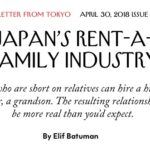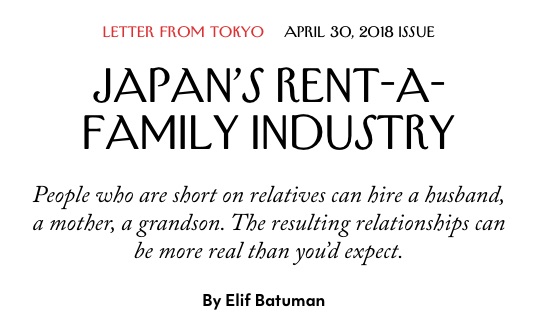 When I started reading Elif Batuman’s recent New Yorker piece on Japan’s rental family business, I expected it to be fascinating. What I didn’t expect was that it would offer striking insights on the current debate over credentials and compensation for early childhood workers in the United States. You should really read Batuman’s whole piece, but the key paragraph is here:
When I started reading Elif Batuman’s recent New Yorker piece on Japan’s rental family business, I expected it to be fascinating. What I didn’t expect was that it would offer striking insights on the current debate over credentials and compensation for early childhood workers in the United States. You should really read Batuman’s whole piece, but the key paragraph is here:
In a sense, the idea of a rental partner, parent, or child is perhaps less strange than the idea that childcare and housework should be seen as the manifestations of an unpurchasable romantic love. Patriarchal capitalism has arguably had a vested interest in promoting the latter idea as a human universal: as the Marxist psychoanalyst Wilhelm Reich pointed out, with women providing free housework and caregiving, capitalists could pay men less. There were other iniquities, too. As [19th Century Utopian feminist Charlotte Perkins] Gilman observed, when caregiving becomes the exclusive, unpaid purview of wives and mothers, then people without families don’t have access to it: “only married people and their immediate relatives have any right to live in comfort and health.” Her solution was that the unpaid work incumbent on every individual housewife—nursery education, household-work management, food preparation, and so on—should be distributed among paid specialists, of both genders. What often happens instead is that these tasks, rather than becoming respected, well-paid professions, are foisted piecemeal onto socioeconomically disadvantaged women, freeing their more privileged peers to pursue careers.
Ultimately, this is the core of what the debate over early childhood teacher compensation and credentials is about: As I’ve written in the past, too often these debates still reflect a kind of assumption that childcare is a manifestation of “unpurchasable” love (and that because of that, people who care for children don’t deserve to be well-paid).
Due to that assumption and an unwillingness to confront the real costs of caring for children (and really, for one another), our society is unwilling to accord people who care for and educate young children the professional status or economic value they deserve. The resulting system works well for no one, but it means the costs of professional opportunity for the educated and affluent are born disproportionately by low-income, less-educated, often racial and ethnic minority women. The resulting high rates of early educator turnover in many settings are harmful for children’s development.
Changing this system is crucial to children’s development, gender equity, and social justice for early care and education workers. But in order to do so, we must confront both the underlying history and attitudes that continue to affect thinking about the value of caring for young children, and the economic/financing challenge of how to pay fairly for work society has historically expected to get free or at a great discount by oppressing women.
Until we can honestly engage both, we cannot expect anything meaningful to change.
